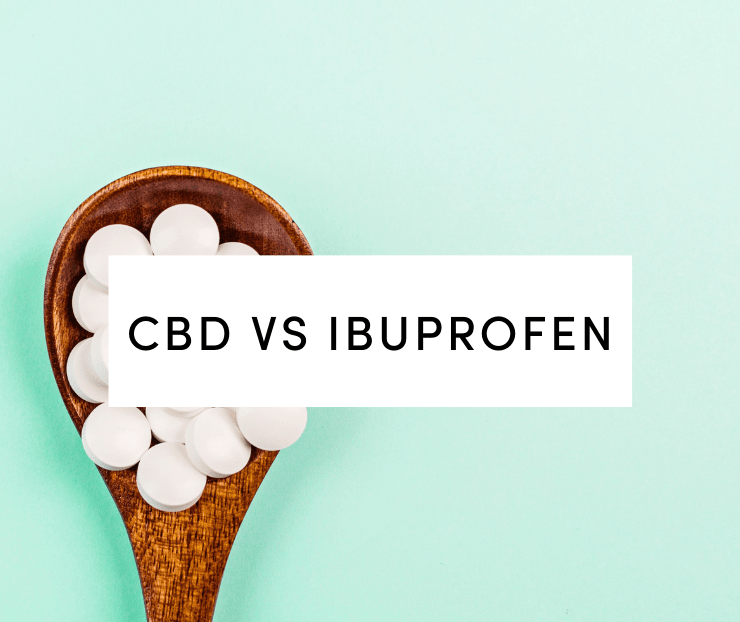CBD vs Ibuprofen
Posted on September 14th, 2020
Chronic pain is one of the most common health-related issues, affecting between 11 and 40 percent of Americans. However, despite the issue being widespread, chronic pain remains to be poorly understood. This results in limited treatment options, particularly for severe chronic pain, leaving numerous individuals frustrated and desperate. The worst part is that typical pain relief medications, both over the counter (OTC) and prescribed, come with all sorts of unpleasant and undesirable side effects.
Pain and inflammation are part and parcel of our lives. These occurrences are natural reactions of the body triggering a self-healing attempt, which is usually successful. When pain becomes too much, it is also natural to look for help outside the body. This is where nonsteroidal, painkillers and anti-inflammatory drugs or NSAIDs come into the picture.
Discovered in 1961, ibuprofen is one of the most common drugs that deal with pain and inflammation. Other common NSAIDs include ketoprofen, aspirin, diclofenac, and several others. They are effective in alleviating fever, pain, inflammation, rheumatoid arthritis, headaches, and more. However, these NSAIDs have severe potential side effects like heartburn, dizziness, headaches, ulcers, liver and kidney disease, heart attack, stroke, and high blood pressure. Also, the drugs come in varying strengths, and some can only be prescribed by a doctor.
Fortunately, there are natural supplements that do not have as severe effects, CBD being one of them. Referred to as cannabidiol in the scientific domain, CBD has dramatically gained popularity over the past few years, thanks to the revelation that it may help with an array of conditions in addition to other potential benefits. So what is the difference between CBD and ibuprofen? Let’s take a deeper look at comparing the two.
So, What Is CBD?
CBD is a cannabinoid, one of the many compounds found in both the marijuana and hemp plant. It is a remarkable compound that may be able to help alleviate pain and symptoms of anxiety, improve digestion and sleep, reduce seizures, and much more.
The most appealing part is that when extracted from hemp, CBD contains little to no THC. This allows people to enjoy the potential benefits that come with consuming marijuana without getting high, which is the psychoactive feeling induced by THC.
What Is Ibuprofen?
This is perhaps the most popular over the counter drugs for pain alleviation. When you suffer nagging pain or a headache, chances are you go for ibuprofen. It belongs to the nonsteroidal anti-inflammatory class, and it is used to reduce pain, fever, and inflammation.
 How Ibuprofen Works
How Ibuprofen Works
When your body sustains an injury, compounds known as prostanoids are released. These include thromboxane, involved in blood clotting, and prostaglandins, involved in inflammation. These compounds are produced by enzymes COX-1 and COX-2, COX standing for cyclooxygenase.
Just like other pain-control and anti-inflammatory drugs, ibuprofen hampers the production of the chemicals generated by the body in response to an infection, trauma, or injury. The drug inhibits prostaglandin production by reducing the activity of cyclooxygenase.
However, similar to aspirin, ibuprofen is also a non-selective COX inhibitor. This means it causes more side effects than other NSAIDs. Studies also show that the drug alleviates pain by boosting endocannabinoid levels, specifically the endocannabinoid known as anandamide.
CBD vs Ibuprofen: Which Is More Effective at Pain Alleviation?
Cannabidiol may help alleviate pain by stimulating CB2 receptors found in the endocannabinoid system. The ECS system is a network of receptors found throughout the body and the brain. It is responsible for the optimal function of bodily functions, such as inflammation, pain, sleep, appetite, etc. Simply put, it’s responsible for a process known as homeostasis.
CBD interacts with these receptors, encouraging the production of endocannabinoids, the neurotransmitters responsible for an array of processes, including pain and inflammation. According to several studies, many conditions might involve endocannabinoid deficiency, including migraines, irritable bowel syndrome, and fibromyalgia.
CBD may help modulate pain thresholds and slow down the release of inflammatory molecules. This is similar to how Advil works. As a matter of fact, cannabinoids tend to work synergistically (in conjunction) with other body systems that manage pain, thus making you feel better quicker. As such, it’s safe to say that cannabidiol has the potential to work similarly to, if not better than NSAIDs like Ibuprofen.
The Uses and Benefits
Although the Food and Drug Administration (FDA) is yet to approve the use of CBD for pain, research has it that the cannabinoid may be effective at alleviating inflammation and varying types of pain, including joint, muscle, and nerve pain.
Research also shows that CBD has the potential to help alleviate pain associated with rheumatoid arthritis, chronic migraine, cancer, back pain, old injuries, endometriosis, inflammatory bowel disease, osteoarthritis, and fibromyalgia. The cannabinoid may also impact other conditions like sleep disorders, acne, depression, epilepsy, anxiety, psoriasis, among others.
As a nonsteroidal anti-inflammatory drug, ibuprofen is used to alleviate mild to moderate pain, inflammation, swelling, and fever. It’s cheap and easily accessible as an OTC drug. Doctors recommend using it in the lowest dose for relief, due to the numerous side effects as well as health risks.
CBD vs Ibuprofen: Side Effects and Safety
Even with research in its early stages, CBD is not known to have severe side effects, is considered safe, and will not lead to addiction. Side effects are rare and usually mild. They include dry mouth, sleepiness, upset stomach, and dizziness. So far, there hasn’t been an established maximum dose for CBD. This means that you are unlikely to overdose on it. It’s important to note that common side effects are often seen in higher doses, therefore, it’s suggested to start with a low dose.
However, cannabidiol can affect how your body metabolizes other drugs, ibuprofen included. This can result in higher levels of the drug in your system due to combining the two. Currently, research is still in the gray area, making it hard to say if it is safe to consume NSAIDs and CBD together.
A lot of pharmaceuticals and CBD utilize the enzyme cytochrome to metabolize and get into the bloodstream. This is especially the case when CBD takes the digestive system route. That is when consumed as tablets, soft gels, edibles, or capsules.
However, when you apply CBD topically, use it sublingually, or vape it, the chances of the compound interacting with pharmaceutical drugs may be minimal.
Potential Side Effects of Ibuprofen
Ibuprofen is considered relatively safe, but there are numerous potential side effects, including:
- Diarrhea
- Bloating
- Dizziness
- Heartburn
- Constipation
- Blurred vision
- Nausea and vomiting
- Headaches
- Rash
- Blistering
- Ringing in ears or tinnitus
Ibuprofen can also cause severe, life-threatening conditions, particularly after long-term use or taking higher doses, including:
- Heart attack
- Stomach bleeding
- Kidney failure
- Liver failure
- Ulcers
- Stroke
- High blood pressure
Additionally, some individuals can have allergic reactions to the drug, especially those with asthma. Seniors are also more vulnerable to particular side effects, including stomach bleeding. As a matter of fact, ibuprofen results in about 40,000 hospitalizations and 3,000 deaths per year among seniors. Overdoses are also not uncommon with this drug. The maximum safe dose of ibuprofen is 1200mg per day.
 Can You Consume CBD With Ibuprofen?
Can You Consume CBD With Ibuprofen?
There are some substances you should never mix like antibiotics and alcohol. As such, it is understandable to be concerned about mixing CBD with NSAIDS, in this case, ibuprofen. Well, research has it that you may be able to mix the two without negative effects.
Given you’re not allergic to ibuprofen, you should be okay taking the compound alongside the drug, as long as you’ve been cleared to do so by a doctor. So far, there haven’t been reported interactions between ibuprofen and CBD, but there could be a personal reaction, and so, it is always advisable to use it with caution and talk with your physician before combining the two.
Also, it is recommended to consume cannabidiol daily and not just when feeling unwell or experiencing pain, even that associated with PMS. According to studies, CBD may help balance hormones throughout the month, aid with period pains, and alleviate PMS symptoms. However, when it comes to ibuprofen, taking it on a daily basis is unadvisable, and should only be consumed when you are in pain.
Do You Need Ibuprofen When Consuming CBD?
Cannabidiol may help alleviate the pain and aches as it helps relax the smooth muscle tissue.
Taking CBD on a daily basis may work to alleviate pain, but depending on your tolerance to the cannabinoid and pain threshold, you may need ibuprofen for a combined effect and thus better results. However, it is advised to only do so if cleared by your physician.
As mentioned earlier, there are many ways to consume CBD, and finding the best one for your needs can be important. If you want to be discreet and have long-lasting effects, taking capsules and edibles is the way to go. However, if you want quick results, sublingual and topical applications are the better route.
CBD vs Ibuprofen: Final Thoughts
As mentioned earlier, research is still being done on how effective cannabidiol is at alleviating chronic pain. The complexity of the endocannabinoid system and how CBD may interact with it may impact the acceleration of this field.
However, CBD may be able to help numerous people find relief, without the severe health risks that come with long-term use of ibuprofen.
If you would like to use CBD for yourself, ensure you only purchase from a trusted source. Be sure to look for high-quality CBD products that offer a third-party lab test. And, always speak with your physician before introducing CBD into your routine.

 How Ibuprofen Works
How Ibuprofen Works Can You Consume CBD With Ibuprofen?
Can You Consume CBD With Ibuprofen?

